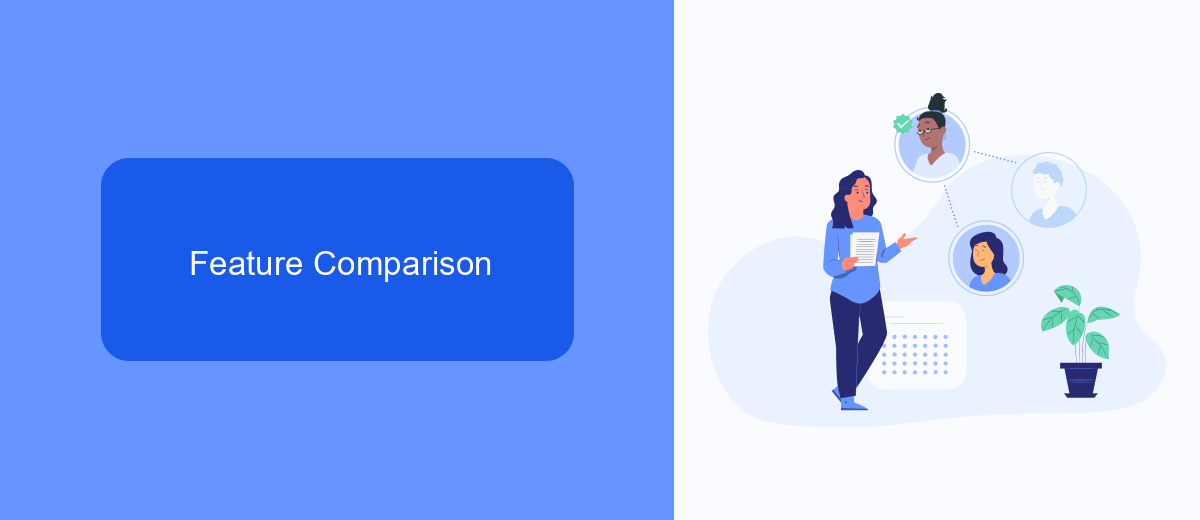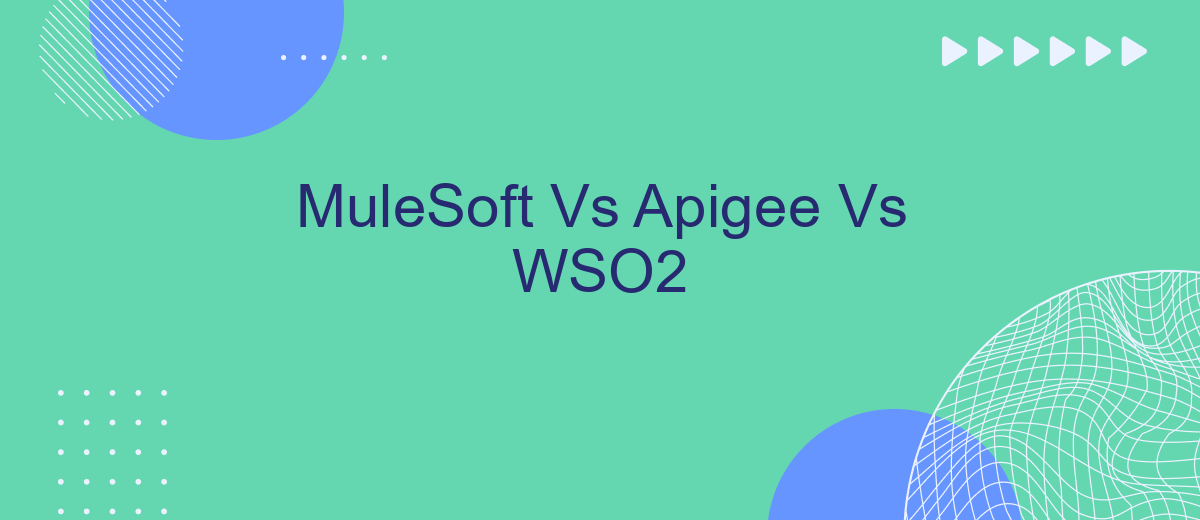In the rapidly evolving landscape of API management, choosing the right platform is crucial for seamless integration and scalability. This article delves into a comparative analysis of three leading API management solutions: MuleSoft, Apigee, and WSO2. By examining their key features, strengths, and potential drawbacks, we aim to guide businesses in selecting the most suitable tool for their unique needs.
Introduction
In today's digital landscape, businesses are increasingly relying on API management platforms to streamline their operations and enhance connectivity. Three of the leading solutions in this space are MuleSoft, Apigee, and WSO2. These platforms offer a range of features and capabilities designed to help organizations manage their APIs effectively, ensuring seamless integration and robust performance.
- MuleSoft: Known for its Anypoint Platform, MuleSoft provides a comprehensive solution for API design, development, and management.
- Apigee: A Google Cloud product, Apigee offers powerful tools for API analytics, security, and monetization.
- WSO2: An open-source platform that focuses on API management, integration, and identity management.
Choosing the right API management platform depends on various factors, including the specific needs of your business, the complexity of your integrations, and your budget. Platforms like SaveMyLeads can also complement these solutions by providing streamlined integration services, helping businesses automate workflows and improve efficiency. This comparison aims to provide a clearer understanding of the strengths and weaknesses of each platform, enabling you to make an informed decision.
Feature Comparison

MuleSoft, Apigee, and WSO2 each offer unique features tailored for different integration needs. MuleSoft is renowned for its Anypoint Platform, which provides a comprehensive suite of tools for designing, building, and managing APIs and integrations. It excels in offering a unified integration experience with robust security features and extensive pre-built connectors. Apigee, on the other hand, stands out for its API management capabilities, focusing on analytics, security, and scalability. It is particularly strong in providing detailed insights into API performance and user behavior, which is crucial for optimizing API usage and ensuring high availability.
WSO2 offers a flexible and open-source approach to integration with its API Manager, which supports a wide range of integration scenarios and customization options. It is highly valued for its cost-effectiveness and the ability to deploy on-premises, in the cloud, or in hybrid environments. For businesses looking to simplify their integration processes, services like SaveMyLeads can be a valuable addition. SaveMyLeads automates lead data transfer between various platforms, reducing manual effort and ensuring seamless data flow, which complements the capabilities of MuleSoft, Apigee, and WSO2 by enhancing overall integration efficiency.
Use Cases and Applications

When considering MuleSoft, Apigee, and WSO2, it is essential to understand their specific use cases and applications to determine which solution best fits your needs. Each platform excels in different areas, making them suitable for various business requirements.
- MuleSoft: Ideal for large enterprises that require robust data integration and API management. MuleSoft's Anypoint Platform offers extensive connectors and pre-built templates to streamline complex integrations.
- Apigee: Best suited for organizations focusing on API security, traffic management, and analytics. Apigee provides advanced tools for API monetization and comprehensive analytics to optimize API performance.
- WSO2: Perfect for businesses looking for open-source solutions with flexibility. WSO2's API Manager and Enterprise Integrator offer customizable options for API management and integration, making it a cost-effective choice.
Additionally, services like SaveMyLeads can complement these platforms by automating lead data transfers between various applications, further enhancing the efficiency of your business processes. By leveraging the strengths of MuleSoft, Apigee, or WSO2, along with SaveMyLeads, organizations can achieve seamless integration and improved operational efficiency.
Pros and Cons

MuleSoft, Apigee, and WSO2 are three prominent API management platforms that offer various features and capabilities. Each has its own strengths and weaknesses, making them suitable for different use cases and business needs.
MuleSoft is known for its robust integration capabilities and comprehensive API management features. Apigee, a Google product, excels in providing analytics and security features for APIs. WSO2 is an open-source platform that offers flexibility and customization possibilities.
- MuleSoft: Pros - Strong integration, extensive connectors, good support. Cons - High cost, complex setup.
- Apigee: Pros - Excellent analytics, strong security, Google Cloud integration. Cons - Expensive, steep learning curve.
- WSO2: Pros - Open-source, highly customizable, cost-effective. Cons - Limited support, requires technical expertise.
When considering these platforms, it's essential to evaluate your specific needs and resources. For businesses looking to streamline their integration processes, services like SaveMyLeads can offer additional support by automating lead data transfers, thus enhancing overall efficiency and reducing manual workload.
Conclusion
In conclusion, MuleSoft, Apigee, and WSO2 each offer distinct advantages depending on the specific needs of your organization. MuleSoft excels in providing a comprehensive integration platform with its Anypoint Platform, making it an excellent choice for enterprises looking for extensive API management and integration capabilities. Apigee, on the other hand, stands out for its robust API management features and is particularly well-suited for businesses that require advanced analytics and security measures for their APIs. WSO2 offers a flexible and open-source solution, which can be highly attractive for organizations that prefer customizable and cost-effective integration options.
When selecting the right platform, consider the unique requirements of your projects and your long-term strategic goals. Additionally, services like SaveMyLeads can complement these platforms by automating lead management and streamlining data integration processes, further enhancing your overall integration strategy. By carefully evaluating the strengths and features of MuleSoft, Apigee, and WSO2, you can make an informed decision that aligns with your business objectives and technological needs.
- Automate the work with leads from the Facebook advertising account
- Empower with integrations and instant transfer of leads
- Don't spend money on developers or integrators
- Save time by automating routine tasks
FAQ
What are the primary differences between MuleSoft, Apigee, and WSO2?
Which platform is best suited for API management?
How do these platforms handle scalability?
Are there any tools for automating integrations with these platforms?
What are the cost considerations for MuleSoft, Apigee, and WSO2?
You probably know that the speed of leads processing directly affects the conversion and customer loyalty. Do you want to receive real-time information about new orders from Facebook and Instagram in order to respond to them as quickly as possible? Use the SaveMyLeads online connector. Link your Facebook advertising account to the messenger so that employees receive notifications about new leads. Create an integration with the SMS service so that a welcome message is sent to each new customer. Adding leads to a CRM system, contacts to mailing lists, tasks to project management programs – all this and much more can be automated using SaveMyLeads. Set up integrations, get rid of routine operations and focus on the really important tasks.

